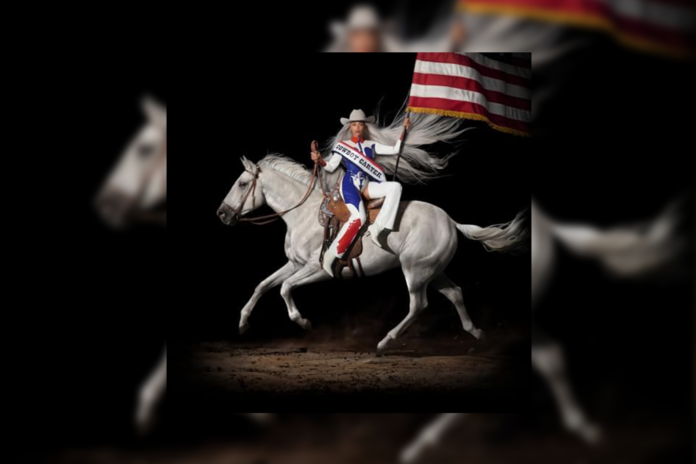
“Cowboy Carter” marks the second album in a three-part series for Beyoncé (marked by the extra I’s in the names of songs), starting with the release of “Renaissance” last year. From the outside, the album cover displaying a star-spangled Beyoncé sitting sideways on a horse holding an American flag bleeds an aesthetic that is undeniably country. She began wearing Cowboy hats during the “Renaissance” era, but no one expected her to completely transcend into country music.
With the release of the singles “TEXAS HOLD ‘EM” and “16 CARRIAGES” on Super Bowl Sunday, it seemed Beyoncé’s genre shift was clear. But, this isn’t what “Cowboy Carter” was trying to accomplish. Queen Bey wants to make it clear, “This[‘Cowboy Carter’] ain’t a Country album. This is a Beyoncé album.”
On the opening track “AMERIICAN REQUIEM,” Beyoncé sings in a gospel-style ballad, “Used to say I spoke too country/And the rejection came, said I wasn’t country ‘nough/Said I wouldn’t saddle up, but/If that ain’t country, tell me what is?”‒ detailing the backlash she received for her musical productions from being too similar to or going against the standard principles of country music. And she’s not wrong, after “TEXAS HOLD ‘EM” reached the top of the Billboard Hot Country Songs chart, the music world spiraled into a whirlwind of controversy–fostering discussions about what exactly makes a song country.
Beyoncé is one of those generational talents whose music has drawn inspiration from multiple different genres. From the pop hits at the beginning of her career, the R&B and soul influence on 2016’s “Lemonade”, and the subtle country notes of “Cowboy Carter,” her work has never once completely identified as a sole personification of a singular classification of music.
“Cowboy Carter” is not trying to break Beyoncé into the country, but rather show that her work belongs there. This album redefines the alienation catered by musical genres and looks to examine music as a vast realm of stylized similarity rather than giving it a specific label. “Cowboy Carter” also makes an important political statement: Black women belong in the country.
This notion is no more apparent than on “BLACKBIIRD,” a cover of Paul McCartney’s popular Beatles song. McCartney has said in interviews that the inspiration is writing about a young American girl during the civil rights movement. With the addition of including Black female country singers Tanner Adell, Tiera Kennedy, Reyna Roberts, and Brittany Spencer, the song serves as a platform to elevate the voices of Black women in the country and fulfill the lyrics’ deeper meaning.
Beyoncé also spotlights Linda Martell, a pioneer for Black women in country music–featuring her on the songs “THE LINDA MARTELL SHOW” and “SPAGHETII.” A name not so well known by many fans of the genre, Martell’s 1970 album “Color Me Country” led her to become the first Black woman country artist to play the Grand Ole Opry. She has also appeared with the likes of singers Hank Snow and Waylon Jennings and been on the variety show “Hee Haw.”
For Beyoncé, “Cowboy Carter” isn’t about making a name for herself in country music, it’s reaffirming that she and other Black women have always been there. Whatever preconceived notions people had about the demographics of country artists or the nature of the songs before, “Cowboy Carter” tears them down. The album itself aims to blur the lines between genres and classify Beyoncé’s work as a combination of multiple different influences, not just a singular type. Putting an end to the debate surrounding the direction of her career, Beyoncé states on the last track of the album “AMEN,” “Them old ideas are buried here.” Those stereotypes are a thing of the past, with “Cowboy Carter” standing in a league of its own.
For comments/questions about this story DM us on Instagram @thewhitatrowan or email the.whit.arts@gmail.com.





